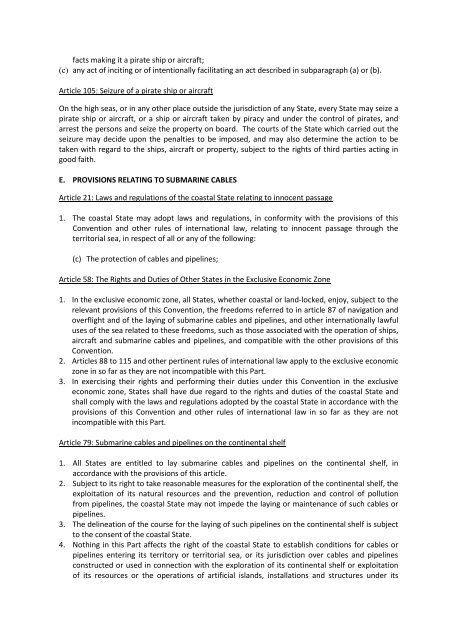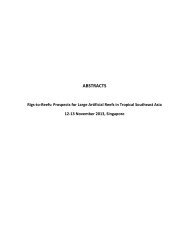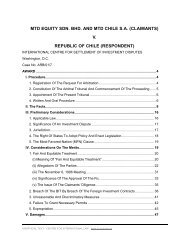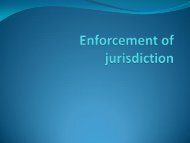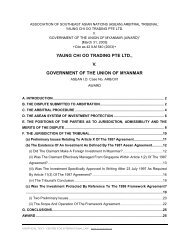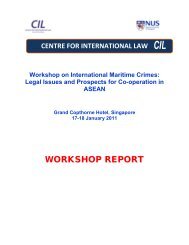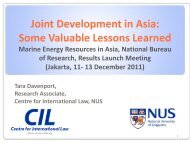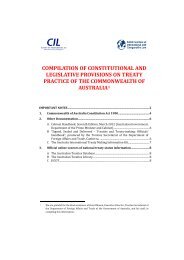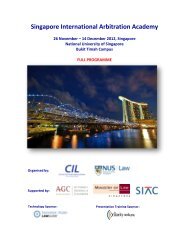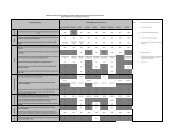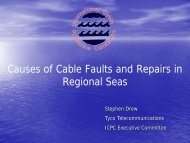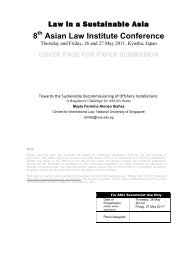UNCLOS - Centre for International Law
UNCLOS - Centre for International Law
UNCLOS - Centre for International Law
Create successful ePaper yourself
Turn your PDF publications into a flip-book with our unique Google optimized e-Paper software.
facts making it a pirate ship or aircraft;<br />
(c) any act of inciting or of intentionally facilitating an act described in subparagraph (a) or (b).<br />
Article 105: Seizure of a pirate ship or aircraft<br />
On the high seas, or in any other place outside the jurisdiction of any State, every State may seize a<br />
pirate ship or aircraft, or a ship or aircraft taken by piracy and under the control of pirates, and<br />
arrest the persons and seize the property on board. The courts of the State which carried out the<br />
seizure may decide upon the penalties to be imposed, and may also determine the action to be<br />
taken with regard to the ships, aircraft or property, subject to the rights of third parties acting in<br />
good faith.<br />
E. PROVISIONS RELATING TO SUBMARINE CABLES<br />
Article 21: <strong>Law</strong>s and regulations of the coastal State relating to innocent passage<br />
1. The coastal State may adopt laws and regulations, in con<strong>for</strong>mity with the provisions of this<br />
Convention and other rules of international law, relating to innocent passage through the<br />
territorial sea, in respect of all or any of the following:<br />
(c) The protection of cables and pipelines;<br />
Article 58: The Rights and Duties of Other States in the Exclusive Economic Zone<br />
1. In the exclusive economic zone, all States, whether coastal or land-locked, enjoy, subject to the<br />
relevant provisions of this Convention, the freedoms referred to in article 87 of navigation and<br />
overflight and of the laying of submarine cables and pipelines, and other internationally lawful<br />
uses of the sea related to these freedoms, such as those associated with the operation of ships,<br />
aircraft and submarine cables and pipelines, and compatible with the other provisions of this<br />
Convention.<br />
2. Articles 88 to 115 and other pertinent rules of international law apply to the exclusive economic<br />
zone in so far as they are not incompatible with this Part.<br />
3. In exercising their rights and per<strong>for</strong>ming their duties under this Convention in the exclusive<br />
economic zone, States shall have due regard to the rights and duties of the coastal State and<br />
shall comply with the laws and regulations adopted by the coastal State in accordance with the<br />
provisions of this Convention and other rules of international law in so far as they are not<br />
incompatible with this Part.<br />
Article 79: Submarine cables and pipelines on the continental shelf<br />
1. All States are entitled to lay submarine cables and pipelines on the continental shelf, in<br />
accordance with the provisions of this article.<br />
2. Subject to its right to take reasonable measures <strong>for</strong> the exploration of the continental shelf, the<br />
exploitation of its natural resources and the prevention, reduction and control of pollution<br />
from pipelines, the coastal State may not impede the laying or maintenance of such cables or<br />
pipelines.<br />
3. The delineation of the course <strong>for</strong> the laying of such pipelines on the continental shelf is subject<br />
to the consent of the coastal State.<br />
4. Nothing in this Part affects the right of the coastal State to establish conditions <strong>for</strong> cables or<br />
pipelines entering its territory or territorial sea, or its jurisdiction over cables and pipelines<br />
constructed or used in connection with the exploration of its continental shelf or exploitation<br />
of its resources or the operations of artificial islands, installations and structures under its


